
As the United Nations Climate Conference in Peru enters its final phase, thousands of people marched in downtown Lima on Wednesday to call for action on global warming. We hear from some of the voices who took to the streets: frontline indigenous and rural communities from across Latin America who are among the most impacted by both the industrial practices that fuel climate change and the impacts of global warming.
Transcript
AMY GOODMAN: We’re broadcasting from COP 20, the United Nations climate conference in Lima, Peru, where Secretary of State John Kerry is due to arrive today as the talks enter their final two days. The last time a U.S. secretary of state attended the summit was Hillary Clinton in 2009 in Copenhagen. Leaders from about 190 nations are trying to work out a draft deal to limit rising global greenhouse gas emissions ahead of next year’s summit in Paris, where an agreement is expected to be finalized. On Wednesday, the presidents of Peru, Chile, Mexico and Colombia urged negotiators to take significant steps towards combating global warming. This is Chilean President Michelle Bachelet.
PRESIDENT MICHELLE BACHELET: [translated] We know that if we don’t reach an agreement at the next conference in Paris, it’s possible that we will be too late. The success of COP 21 next year will depend to a great degree on the agreements reached here, and that means that we have no right to fail. Future generations will hold us accountable, and with good reason, if we allow this opportunity to go by.
AMY GOODMAN: On Wednesday, thousands of people marched here in downtown Lima, Peru, to call for action on climate change, among them members of Peru’s more than 50 indigenous communities. Across Latin America, indigenous and rural communities are among the most impacted by mining, oil drilling and other extractive industries that fuel global warming. They’re also among those most vulnerable to the effects of climate change. Democracy Now!’s Amy Littlefield spoke to members of those frontline communities. Some had traveled to Lima, Peru, from as far away as Mexico.
VENANCIA CRUZ DOMÍNGUEZ: [translated] My name is Venancia Cruz Domínguez. I come from the indigenous movement of Santiago de Anaya in Hidalgo, Mexico. There are six municipalities whose environment is being contaminated by the company Cementos Fortaleza, whose owner is Carlos Slim, a huge magnate considered the richest and most powerful man in the world. Yet he came to rob our clean air, our tranquility, and to take away our water. The impact is being felt in the environment. Every morning we rise to see plants and outdoor furniture covered with a thin film. The crops of my neighbors are being impaired by this thin film that is produced by Cementos Fortaleza in Santiago de Anaya.
YSABEL VALDIVIA MARTÍNEZ: [translated] My name is Ysabel Valdivia Martínez, and I am a defender of the Amazon and a Peruvian. And sadly, I see that a North American, Dennis Nicholas Melka, with 20 companies, is deforesting all the Amazon, including virgin forests and secondary forests, to replace it with palm oil. Daily, they knock down a thousand hectares of virgin forest, affecting the biodiversity, the flora, the fauna, the water—all of that to exploit palm and to industrialize it for biodiesel.
ATOQ KURTURKANKI: [translated] My name is Atoq Kurturkanki. How does climate change impact us? First of all, there is no rain anymore. The rivers have dried up, because the miners use water, and that water is poisoned, and the animals die. For us, the Andean or indigenous community, they have eliminated our economy, including agriculture, textiles and cattle raising. All of these things they have taken from us. Effectively, they have cut off our arms, and we are practically like walking dead.
PHAXSI RODRÍGUEZ APIZACA: [translated] My name is Phaxsi. In Aymara, it means “moon.” And I’m here to raise awareness, to say to all of humanity that we have to return to the heart of Mother Earth. We have to wake up. We have to unite. It’s time to say, “Enough.” We have to return, because the Aymara, we live together with the environment. We Aymara live together with the Earth. And we’re being impacted because right now the Aymara people are suffering from drought. And that’s why I’m asking the great representatives of the world to wake up, that the change begins now, that the change begins in every corner of the Earth. This is the message that we bring, the cosmic message to every corner of the Earth from the wisdom of our ancestors.
AMY GOODMAN: That report produced by Amy Littlefield and John Hamilton. Special thanks to our Spanish team at Democracy Now!, Clara Ibarra and Andrés Conteris. You can see our Spanish coverage of the COP at democracynow.org by clicking on the tab “Español.”


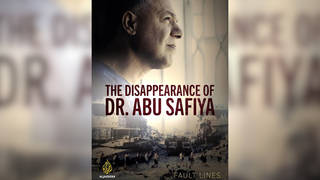
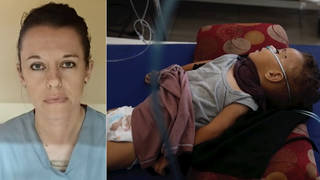
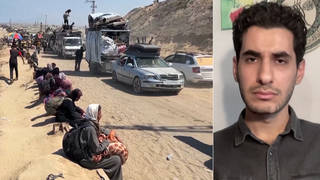





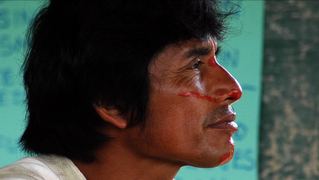
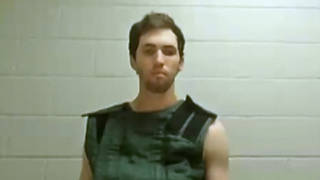
Media Options